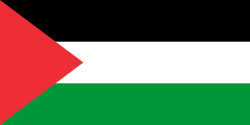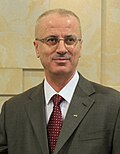This article possibly contains original research .(November 2015) |
| Prime Minister of the State of Palestine | |
|---|---|
| رئيس وزراء دولة فلسطين | |
 | |
 | |
| Palestinian government | |
| Style | His Excellency |
| Appointer | The President |
| Term length | 4 years |
| Precursor | Prime Minister of the PNA |
| Formation | 6 January 2013 |
| First holder | Salam Fayyad |
| Salary | 48,000 USD annually [1] |
 |
|---|
Officeholders whose status is disputed are shown in italics |
| |
The prime minister of the State of Palestine is the head of government of the State of Palestine. The post has been in existence since January 2013, when the Palestinian National Authority was officially renamed [2] into the State of Palestine and replaced the previous position of the prime minister of the Palestinian National Authority.[ citation needed ]






